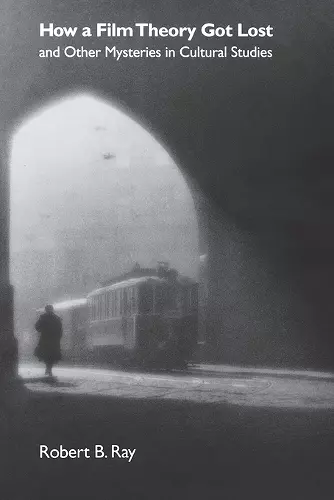How a Film Theory Got Lost and Other Mysteries in Cultural Studies
Format:Paperback
Publisher:Indiana University Press
Published:22nd Apr '01
Currently unavailable, and unfortunately no date known when it will be back

New ways of thinking about the movies, popular music, and Postmodernism.
In the 1920s, when film criticism was as new as the cinema itself, a particular way of thinking about the movies developed in Paris. This collection of essays discusses this mystery and others like it: Why did photography and the detective story originate at exactly the same time?
How a Film Theory Got Lost and Other Mysteries in Cultural Studies
Robert B. Ray
Foreword by James Naremore
Challenges accepted ideas about film and cultural studies.
In the 1920s, when film criticism was as new as the cinema itself, a particular way of thinking about the movies developed in Paris. The cinema, this theory suggested, turns on photography's automatism, the revolutionary fact that for the first time in human history a perfect representation of the world can be produced by accident. Moreover, the camera's gaze has the potential to transform ordinary objects—a telephone, a letter on a desk, a woman's face—into spellbinding images, swarming with details whose precise appeal remains unpredictable. By the 1930s, this theory of photogénie (photogenia) had vanished from most serious writing about film. Why did this disappearance occur? In this collection of essays, Robert B. Ray discusses this disappearance and other mysteries like it: Why did photography and the detective story originate at exactly the same time? Why has some of the most prominent academic writing about the cinema resisted anything but "scientific" accounts of the movies? What counts as "knowledge" in film studies or any intellectual discipline? What do the French Impressionists have in common with the Sex Pistols? How did Douglas Sirk's critically ignored melodramas become "subversive critiques of bourgeois ideology"? How did the fate of Sirk's movies help us understand postmodernism and the avant-garde? In taking up these questions, Ray's essays challenge certain ideas about film and cultural studies, while arguing for a mode of writing about the movies and experimental art that would respect the abidingly mysterious effect of their images and sounds.
Robert B. Ray, Director of Film and Media Studies and Professor of English at the University of Florida, is author of A Certain Tendency of the Hollywood Cinema 1930–1980 and The Avant-Garde Finds Andy Hardy. He is also a member of The Vulgar Boatmen, whose records include You and Your Sister, Please Panic, and Opposite Sex.
Contents
Foreword by James...
ISBN: 9780253214386
Dimensions: unknown
Weight: 322g
184 pages